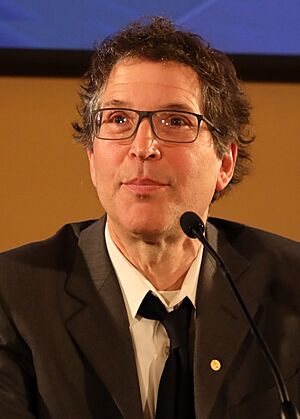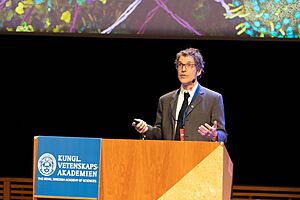David Baker (biochemist) facts for kids
Quick facts for kids
David Baker
|
|
|---|---|

Baker in 2024
|
|
| Born | October 6, 1962 Seattle, Washington, U.S.
|
| Alma mater | |
| Known for |
|
| Spouse(s) | Hannele Ruohola-Baker |
| Awards |
|
| Scientific career | |
| Fields | Computational biology |
| Institutions | |
| Thesis | Reconstitution of intercompartmental protein transport in yeast extracts (1989) |
| Doctoral advisor | Randy Schekman |
| Other academic advisors | David Agard |
| Doctoral students | Richard Bonneau |
| Other notable students | Post-docs:
|
David Baker is an American scientist born on October 6, 1962. He is a biochemist and a computational biologist. This means he uses computers to study living things.
He is famous for finding ways to design proteins and predict their 3D shapes. Proteins are tiny building blocks inside all living things.
David Baker works as a professor at the University of Washington. He is also a researcher at the Howard Hughes Medical Institute. In 2024, he won the Nobel Prize in Chemistry. He received this award for his amazing work on designing proteins using computers.
He is a member of the United States National Academy of Sciences. He also leads the Institute for Protein Design at the University of Washington. He has helped start many companies that use science to create new medicines. Time magazine named him one of the 100 most important people in health in 2024.
Contents
About David Baker
Early Life and School
David Baker was born in Seattle, Washington. His birthday is October 6, 1962. His father was a physicist, and his mother was a geophysicist.
He went to Garfield High School in Seattle. After high school, he studied biology at Harvard University. He earned his first degree there in 1984.
Then, he went to the University of California, Berkeley. He earned his PhD in biochemistry in 1989. He studied how proteins move inside yeast cells. Later, he did more research at the University of California, San Francisco.
His Career Journey
In 1993, David Baker joined the University of Washington School of Medicine. He became a professor in the Department of Biochemistry. In 2000, he became a researcher for the Howard Hughes Medical Institute.
In 2009, he was chosen as a Fellow of the American Academy of Arts and Sciences. This is a special honor for important thinkers.
His Family Life
David Baker is married to Hannele Ruohola-Baker. She is also a biochemist at the University of Washington. They have two children together.
What David Baker Studies
David Baker is best known for using computers to understand proteins. He studies how proteins are shaped and what they do. His team also does experiments in the lab. He has written over 600 science papers.
Understanding Protein Shapes
His team created a computer program called Rosetta. This program helps predict the 3D shape of proteins. They made it even better to design new proteins.
- Rosetta@home: This is a special project where many people help. They let their home computers run parts of the Rosetta program. This helps solve big science problems faster.
- Foldit: This is a fun computer game. Players try to fold proteins into their best shapes. The game helps scientists find new ways to fold proteins.
David Baker also led the Rosetta Commons. This is a group of labs that work together. They create software to predict and design protein structures. His team often joins competitions to predict protein shapes. They use their Rosetta program.
More recently, his team developed a new program called RoseTTAFold. It uses artificial intelligence to predict protein shapes.
Designing New Proteins
David Baker's team also works on designing brand new proteins. They created a protein called Top7. This was the first time scientists designed a protein with a completely new shape.
In 2017, his Institute for Protein Design received a lot of money. This money helps them continue their important research.
In 2019, David Baker gave a TED talk. He spoke about how designing new proteins could help solve big problems. These problems include finding new medicines or creating new materials.
He has also helped start several companies. These companies use his protein research to create new products.
Awards and Honors
David Baker has received many awards for his work.
- For Protein Folding: He won the Overton Prize in 2002. He also received the Sackler International Prize in Biophysics in 2008. In 2022, he received the Wiley Prize and the BBVA Foundation Frontiers of Knowledge Award.
- For Protein Design: He won the Newcomb Cleveland Prize in 2004. He also received the Feynman Prize in Nanotechnology in 2004. In 2021, he won the Breakthrough Prize in Life Sciences.
In 2024, David Baker was awarded half of the Nobel Prize in Chemistry. He won it for his work on designing proteins. The other half of the prize went to John M. Jumper and Demis Hassabis. They developed a program called AlphaFold that predicts protein structures.
See also
- List of Jewish Nobel laureates
 | Laphonza Butler |
 | Daisy Bates |
 | Elizabeth Piper Ensley |


